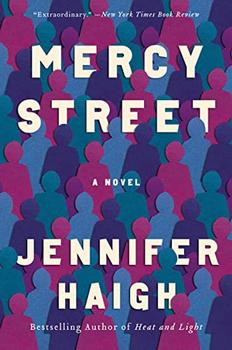Summary | Excerpt | Reviews | Beyond the Book | Readalikes | Genres & Themes | Author Bio

A Novel
by Jennifer Haigh
When Claudia was sent to the store for bread or milk, the cashier held the food stamps by their edges, as though they were not quite clean.
Claudia's mother grew up poor and having kids made her poorer and yet she continued having them, first her own and then other people's, long past the point where she had any patience for them. She didn't enjoy them in any discernible way, and yet she couldn't stop acquiring them. At a certain point Claudia began to see this as a sickness, her mother as obsessive-compulsive, a hoarder of children. Only later did she grasp what now seems obvious: Deb raised other people's kids because it was one of only a few things she could earn money doing. The world was full of discarded people, sickly old ones and damaged young ones, and she was a paid caretaker. It said something about the world that this was the worst-paying job around.
Raise wasn't the right word. The fosters were given food and shelter and more or less left to raise themselves. They were bathed twice a week—at Aunt Darlene's, if the water was out. They were fed adequately and were never hit, which put them miles ahead of where most had started out in life. Deb said, often, that she treated them like her own children, and Claudia can attest that this was true.
The fosters, her mother called them. There was no suggestion, ever, that they were Claudia's brothers and sisters. The fosters were their own category. At the time this didn't strike her as cruel.
AFTER TARA, THE LINES WENT QUIET. ON WEDNESDAYS THE call volume waxed and waned for inscrutable reasons: twenty minutes of dead silence and then, suddenly, a half dozen calls were waiting in the queue. Tuesdays and Fridays were quieter, Thursdays busier. On Mondays the line rang nonstop—fallout from the weekend, its psychic detritus scattered like confetti after a parade. Women called from taxicabs, windy street corners, T stops, Dunkin' Donuts. Sometimes they called from work. Late period, broken condom, suspicious lesion, their narratives interrupted periodically to serve a customer. You want fries with that?
"Well, that was disheartening." Naomi peeled off her headset and took a tin of mints from her purse. In her real life she was an anthropologist at Harvard. For six weeks each summer, she did fieldwork in some developing country, where she seemed to buy all her clothes. That morning she wore a sack-like dress made of some rough fabric, like a medieval penitent, and a necklace that looked like a chicken bone hanging from a leather cord.
"That poor child is getting married next month. She's terrified she'll get her period on her honeymoon, because her fiancé would freak."
"She said that?"
"Her exact words. 'My fiancé would freak.'" Naomi gave her Edvard Munch look, mouth open in a parody of screaming. "And I'm thinking, Sweetie, you're sure you want to marry this guy? Every month, you're going to worry about him freaking?"
Claudia said, "It sounds like a long life."
Naomi rose, stretched, glanced out the window. "It's snowing," she reported.
"Again? " How was it even possible? Across the river in Somerville, Claudia's Subaru—its trunk packed with a shovel, blankets, and a bag of kitty litter to provide traction—was still encased in the snowbank where the plow had buried it. Digging it out would take a solid hour. It hardly seemed worth the effort.
"There's another system blowing in," said Naomi. "The Weather Channel is calling for a foot."
"Ugh. I was supposed to run up to Maine this weekend. To check on my mom's house." Claudia had long referred to the trailer this way—aware, always, that she was being deceptive. Her mother had used the same word, without hesitation; to her, house and trailer were interchangeable. Deb, when she said it, would have passed a polygraph. To her it wasn't a lie.
Excerpted from Mercy Street by Jennifer Haigh. Copyright © 2022 by Jennifer Haigh. Excerpted by permission of Ecco. All rights reserved. No part of this excerpt may be reproduced or reprinted without permission in writing from the publisher.
Your guide toexceptional books
BookBrowse seeks out and recommends the best in contemporary fiction and nonfiction—books that not only engage and entertain but also deepen our understanding of ourselves and the world around us.